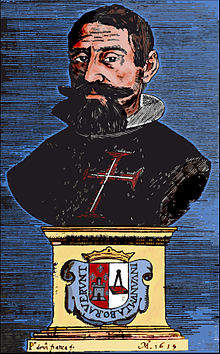Manuel de Faria e Sousa
Manuel de Faria e Sousa (born March 18, 1590 on the Quinta da Caravela, Pombeiro , Portugal ; † June 3, 1649 in Madrid , Spain ) was a Portuguese writer who was mainly active as a poet, historian and editor . He wrote his work exclusively in Castilian . He is also considered the first important Camões researcher.
Life
Manuel de Faria e Sousa was born in 1590 on the estate (country estate) Quinta da Caravela near Pombeiro. His father was Amador Pires, his mother Luisa de Faria e Sousa. At the age of 10 he came to the monastery in Braga to attend the monastery school there. His father was friends with the Archbishop of Porto , Dom Frei Gonçalo de Morães , and made it possible in 1604 for the 14-year-old to work as the archbishop's private secretary while continuing his studies. In 1614 he married Dona Catharina Machado, with whom he had ten children and whom he sang as "Albania" in his poetic work.
After the death of his employer in 1618 he was initially unemployed and withdrew to his father's estate. In 1619, however, he got another job: he became chief secretary of Pedro Alvares Perreira , the Conde (Count) of Muge, state secretary to King Don Philip II of Spain, and state commissioner for Portugal. In 1628 he returned to Portugal. 1631 he was after the death of his second employer, the Count of Muge, Chefsektretär Dom Manuel de Moura , Ambassador of Portugal in the Papal States . This enabled him to have an audience with his boss at Pope Urban VIII. In 1634 he returned to Madrid, but was arrested and imprisoned, but was released three months later. The Holy Inquisition had him arrested because of some comments in his preface to the editorship of the Lusiads of Camoes. He then retired and received a pension of 60 ducats a year. Overall, he has been described as a hardworking and peaceful person.
On June 3, 1649 he died in Madrid in the house of the Marques de Montebelo. His remains were brought to the monastery in Pombeiro on September 6, 1660 and buried there.
Camões research
Manuel de Faria e Sousa is generally considered to be the first researcher to study the life and work of Camões. However, no critical-historical working method is to be expected from him, since he glorifies the work without criticism. Above all, the Lusiads and many of Camões' poems were edited by him.
Own work
Faria e Sousa wrote in Castilian without exception, although he was Portuguese. This explains his fame in Spain and the interest abroad in his Camões research and his historical works. As a historian, he tried his hand at extensive works on the overall presentation of Portuguese history in Europe, Africa and Asia, but due to his death he was no longer able to complete the work. In this area he follows the tradition of the humanist and historian João de Barros . Sonnets , eclogues , canzons and many madrigal texts can be found in his poetic work . Later translations into English followed, especially his historical work, such as History of Portugal (1698) and Portuguese Asia (1695). His work has not yet been translated into German.
Work (selection)
- Noche Claras, 1624-1626, poetry (first complete selection of his poetry).
- Fuente de Aganipe, rimas varias, 1644-1646, poetry, (7 volumes).
- Lusiadas de Luis de Camoens, Principe de los Poetas de Espana, 1639 (editor of the Lusiads of Camoes).
- Europa portuguesa, 1667, historical writing.
- Asia portuguesa, 1666-1675, historical writing.
- Africa portuguesa, 1681, posthumous, historical writing.
Individual evidence
- ↑ The Lusiads . 1800-1882. Retrieved August 30, 2013.
Web links
- http://www.usafelgueiras.blogspot.com/2009/03/biografia-de-d-manuel-de-faria-e-sousa.html
- http://www.theodora.com/encyclopedia/f/manuel_de_faria_y_sousa.html
- http://www.academic.ru/dic.nsf/meyers/41559/Faria
| personal data | |
|---|---|
| SURNAME | Faria e Sousa, Manuel de |
| BRIEF DESCRIPTION | Portuguese writer |
| DATE OF BIRTH | March 18, 1590 |
| PLACE OF BIRTH | Pombeiro |
| DATE OF DEATH | June 3, 1649 |
| Place of death | Madrid |

